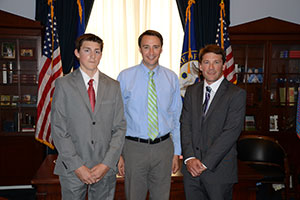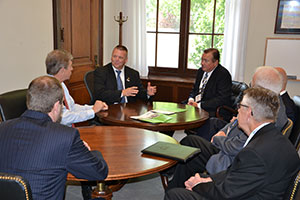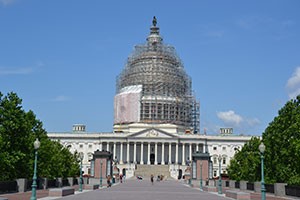Talking propane on Capitol Hill
John Eddinger and his 13-year-old son, Jacob, were having lunch between lobby meetings on Capitol Hill when Jacob posed a rather challenging question to his father.
The question: Does any of this lobbying stuff work?
John, who represents the fourth generation of his family to operate Eddinger Propane Gas Inc., based in Bally, Pa., has lobbied for propane for years in Washington, D.C., by attending the National Propane Gas Association’s (NPGA) annual lobbying event.
So the question made John stop and think.
“I think after this year the [Congressional] Propane Caucus is the best direct result we can see from Propane Days,” says Eddinger, referring to the bipartisan forum that was established earlier this year to keep Congress informed about issues the propane industry deems important.
Eddinger brought up the caucus while visiting with Katharine Bruce, a legislative assistant to Rep. Ryan Costello, R-Pa. Costello wasn’t one of the caucus’ 10 founding members, but Eddinger says after visiting with Bruce and briefly meeting Costello that he’d like to see Costello join it.

Eddinger Propane’s John Eddinger, far right, and his son Jacob, far left, meet Rep. Ryan Costello, R-Pa., who represents them in Pennsylvania’s Sixth District.
According to NPGA, at least nine members of the House of Representatives joined the caucus in the first couple days following Propane Days. That’s the kind of action Eddinger and other retailers want to see from their efforts.
“We need the House, Senate, Democrats, Republicans and Independents to all come together for a two-thirds vote, which is very difficult at times,” Eddinger says. “This propane caucus comes down to a personal decision that every representative can make.”
Making the effort
Lobbying is a personal decision and it’s not for everybody, Eddinger says, but he does it to build the Pennsylvania Propane Gas Association’s presence on Capitol Hill.
Making the time to lobby isn’t always easy for retailers, though. Eddinger, for example, says he or manager Michael Mutter is needed in Eddinger Propane’s office at all times. Both can’t be gone at once, he says.
“Our manager, Michael Mutter, is the president of the Pennsylvania Propane Gas Association,” Eddinger says. “Both of us have a hard time leaving and having it run smoothly. He goes to all the Pennsylvania Propane Gas Association meetings as a president, and I can’t attend them with him. We feel one of us should go to Propane Days each year, and I feel comfortable each year doing it for so many years.”
In addition to time, money is another consideration retailers must make when choosing to lobby.
“It’s not bad for me because I’m only three hours away and I’m not catching a flight,” Eddinger says. “Washington is not the cheapest city in terms of lodging, though. There is no McDonalds on Capitol Hill. It’s not the most cost-effective thing to attend, and there is a business expense.”

Sen. Roy Blunt, R-Mo., second from left, spends time with propane retailers, suppliers and allied trade representatives from his state. Pictured clockwise from the bottom left are Brian Brooks, Brooks Gas; Blunt; Randy Warner, Ferrellgas; Steve Ahrens, the Missouri Propane Gas Association; Scott Brockelmeyer, Ferrellgas; John Brooks, Brooks Gas; and John Ketchum, Gas Equipment Co.
Still, someone must tell propane’s story. That factor regularly drives a number of retailers to Washington.
“The reason I do it and the reason all propane marketers should do it is because the propane industry, like every industry in this country, is under siege of overregulation – regulation that picks winners and losers,” says Malcolm Barrett, owner of Barrett Propane in Prescott, Ariz. “If we don’t go to Washington and fight for parity, equality or less regulation, we’re going to get run over. Many industries have already been run out.”
Barrett, like Eddinger, says the Congressional Propane Caucus is a victory for the propane industry.
“I think it’s a good idea simply because it gives us a little quicker access,” Barrett says. “People in the propane caucus are already informed and up to speed on propane issues.”
Phil Squair, NPGA’s senior vice president of public and governmental affairs, stressed that same point in remarks to attendees at Propane Days.
“Public policy is such an important part of what our industry does,” he says. “It really behooves us to be as involved and as engaged as we possibly can be.”
The issues
This year, retailers, manufacturers and allied trade representatives engaged Congress on several issues. In addition to the caucus, they lobbied for the equalization of highway taxes on propane and gasoline, as well as for two propane autogas-specific issues.
One autogas-related request is to extend the 50-cent-per-gallon Alternative Fuel Credit and the Alternative Fuel Vehicle Refueling Property Credit.
“In December, Congress passed an extension of about 50 tax credits,” says Matt Bisenius, NPGA’s director of legislative affairs. “The two [autogas] tax credits expired, so we are looking for another extension of those.”
Democrats are more likely to support an extension of the tax credits, according to Squair.
“Republicans are split,” he says. “Some see the value of having them in the interim. There are a number of Republican members who don’t like these tax credits at all. They see it as federal government involvement in the private sector.”
When a congressperson is opposed to propane-related tax credits, Squair says alternative approaches can be taken.
“Congressman [Mike] Pompeo was an opponent,” Squair says. “If he doesn’t like tax credits for alternative fuels, then you can step back and say, ‘That’s fine, but let’s have parity in the end.’ Don’t let the natural gas guys come in and get something that propane doesn’t have. If credits don’t get extended, they should not be extended for any alternative fuel.”
The other autogas-related request this year is to exempt autogas dual-fueled vehicles from the Corporate Average Fuel Economy (CAFE) credit cap so parity with natural gas is created. In addition, Propane Days lobbyists asked Congress to direct the U.S. Environmental Protection Agency (EPA) to correct its multiplier incentive to include propane vehicles. According to NPGA, correcting the incentive will level the alternative fuel playing field.
“What we’re trying to leave with Congress is they should be pressuring EPA to treat alternative fuels equally,” Bisenius says. “EPA shouldn’t be picking winners and losers. We’re working to build support and a coalition that can really pressure EPA to treat us the same way they’re treating natural gas.”
Lobbying approaches
Walking into a congressperson’s office and asking him or her to vote a certain way on a bill or draft new legislation can be intimidating. But Squair reminds propane retailers that members of the Senate and House are in office to serve them.
Retailers can approach members of Congress on Capitol Hill the same way they approach their own customers, he says.
“It’s important to remember that these meetings are sales meetings,” Squair says. “If you think of it as a sales meeting, it puts you on more familiar turf.”
In this case, rather than trying to sell propane gallons, retailers are trying to convince members of Congress to support them on issues that benefit their businesses and, ultimately, the district or state that member serves.
“There are a couple of different ways to do that,” Squair says. “Build chemistry with them, and you have to do that by introducing yourself. They don’t necessarily know you, your company. Some of them don’t know propane.”
Some members of Congress are new to their jobs, Squair adds. In that case, they may need an introduction to propane and its contribution to the U.S. economy.
“Make sure to tell them where your district is,” he says. “Give them a sense of your impact on your jurisdiction. You and your employees are all voters, hopefully. As voters, you have value. You have something they want: your support. If they give you support, you’re more likely to give them support in an election.”
Check out LP Gas‘ 2015 Propane Days coverage here.
Photos: LP Gas Magazine

















